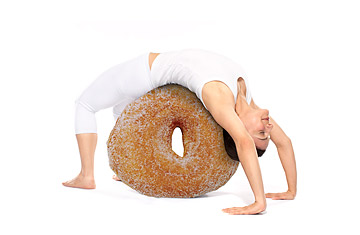
Whether because exercise makes us hungry or because we want to reward ourselves, many people eat more — and eat more junk food, like doughnuts — after going to the gym.
(3 of 7)
Church, who is 41 and has lived in Baton Rouge for nearly three years, has a theory. "I see this anecdotally amongst, like, my wife's friends," he says. "They're like, 'Ah, I'm running an hour a day, and I'm not losing any weight.'" He asks them, "What are you doing after you run?" It turns out one group of friends was stopping at Starbucks for muffins afterward. Says Church: "I don't think most people would appreciate that, wow, you only burned 200 or 300 calories, which you're going to neutralize with just half that muffin."
You might think half a muffin over an entire day wouldn't matter much, particularly if you exercise regularly. After all, doesn't exercise turn fat to muscle, and doesn't muscle process excess calories more efficiently than fat does?
Yes, although the muscle-fat relationship is often misunderstood. According to calculations published in the journal Obesity Research by a Columbia University team in 2001, a pound of muscle burns approximately six calories a day in a resting body, compared with the two calories that a pound of fat burns. Which means that after you work out hard enough to convert, say, 10 lb. of fat to muscle--a major achievement--you would be able to eat only an extra 40 calories per day, about the amount in a teaspoon of butter, before beginning to gain weight. Good luck with that.
Fundamentally, humans are not a species that evolved to dispose of many extra calories beyond what we need to live. Rats, among other species, have a far greater capacity to cope with excess calories than we do because they have more of a dark-colored tissue called brown fat. Brown fat helps produce a protein that switches off little cellular units called mitochondria, which are the cells' power plants: they help turn nutrients into energy. When they're switched off, animals don't get an energy boost. Instead, the animals literally get warmer. And as their temperature rises, calories burn effortlessly.
Because rodents have a lot of brown fat, it's very difficult to make them obese, even when you force-feed them in labs. But humans--we're pathetic. We have so little brown fat that researchers didn't even report its existence in adults until earlier this year. That's one reason humans can gain weight with just an extra half-muffin a day: we almost instantly store most of the calories we don't need in our regular ("white") fat cells.
All this helps explain why our herculean exercise over the past 30 years--all the personal trainers, StairMasters and VersaClimbers; all the Pilates classes and yoga retreats and fat camps--hasn't made us thinner. After we exercise, we often crave sugary calories like those in muffins or in "sports" drinks like Gatorade. A standard 20-oz. bottle of Gatorade contains 130 calories. If you're hot and thirsty after a 20-minute run in summer heat, it's easy to guzzle that bottle in 20 seconds, in which case the caloric expenditure and the caloric intake are probably a wash. From a weight-loss perspective, you would have been better off sitting on the sofa knitting.
Self-Control Is like a Muscle
